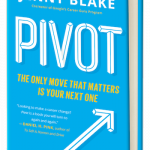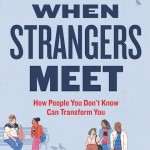
How do you follow up on a bestselling book that has been translated into 18 languages, and named one of the top 10 best business books by Amazon.com and one of the best books on innovation by BusinessWeek? If you’re Frans Johansson, who wrote The Medici Effect in 2004, you acknowledge that you owe much of that widespread recognition to catching a lucky break. And then you research how many other great success stories are the result of random connections or serendipitous events, and you write your next book about it.
In The Click Moment, Johansson, who is CEO of The Medici Group, a strategy consulting firm that focuses on growth through innovation, presents “two very simple but highly provocative ideas.” The first is that success is random. And the second, he writes, is that “there are a number of specific actions that individuals can take to capture randomness and focus it in our favor.”
Johansson sat down with Convene at the Scottish Exhibition + Conference Centre in Glasgow in July – during a break from his presentation at the inaugural PCMA Global Corporate Summit – to offer a sneak peek of The Click Moment on the eve of its publication.
Does The Click Moment build upon your first book, The Medici Effect?
It is related, but it is not a part two. The Click Moment really says that great success comes from combinations of different concepts, and that those combinations are essentially random. You do not really necessarily know ahead of time if something is going to work or not. While The Medici Effect focused on the combinations part, this book focuses more on the random part. What this book says is that serendipity and randomness has far more to do with success than we think – but that there are ways to harness [randomness] and that the ways to harness are endless. And so the book first explains why that is, because we have a hard time believing that success can be so much unplanned. We like to think that there is a plan behind it, because if we just analyzed it, we could figure out the right answer, and that that is the way we sort of drive towards success. But the reality is, it is not. The book goes through three ways in which we harness randomness, in which we can capture serendipity. That is it in a nutshell.
Is your book based on research as well as your experience working with the companies that you have consulted for?
A lot of it is based on the experience of working with companies and research, of course, and also a philosophical argument. When The Medici Effect was published, there were probably another 15 innovation books at the same time that came out – two others from the same publisher that same month, from Harvard Business Review Press. And so how do you stand apart?
Well, the way it happened for me was that one day my wife came home. She was working with JP Morgan Chase as a diversity consultant, and she said that she had just been tasked to find a business case on diversity. And she said, “You know, I think your book is the answer.” And I was like, wow. I mean, in my mind, I was thinking maybe scientists or chief innovation officers or marketing folks [would be a better fit], but literally, within a month, I was presenting to the head of JP Morgan and he said there is something here. And that led to chief diversity officers everywhere [bringing] me into their company to talk about how diversity drives innovation. The CEO of the company usually would then have me go and talk to the head of business, or sales, or marketing, or strategy, or something like that. And then all of a sudden I was [consulting] throughout the company.
Now, the reason I tell you this story is because one evening when I was at a client event, this head-of-strategy guy sort of leans over to me and says, “You know, your side-door strategy has been brilliant.” I am like, “What do you mean by side-door strategy?” [He said,] “Most innovation authors would have knocked on my door as the head of strategy, or the chief innovation officer, or something like that. But you got the chief diversity officer to introduce me. You knocked on the one door other innovation authors did not.”
Great side-door strategy, except —
You didn’t plan it that way.
I didn’t plan it that way. That is just how it turned out. I got lucky. Starbucks, Microsoft, movies, TV shows, and science discoveries – over and over again, it comes down to this – it comes down to that ultimately there comes a point where fate could have turned one way or another. That is why I call it The Click Moment. That moment is what everything hinges upon. So what you have to do is actually try to create a lot of click moments in your life.
When Starbucks started out, they did not sell coffee like the way we drink it. They sold coffee beans. They sold coffee-making equipment. Howard Schultz was the CEO at the time, he was head of retail. He was in Milan for a housewares conference when he stumbled into an espresso bar and he made the connection when he tasted a coffee latte. But that is not enough, right? You can have this insight. But it is not enough, because then you have to actually do something, so that is what I call “Purposeful Bets.”
How might meetings tie into this?
Ultimately, if you are going to have more click moments, it behooves you to be exposing yourself to more people. But that is not enough, because the question is, what type of people? [It’s like] if you go to a café and you expect to see someone there and then you see that person there, that is not lucky. That is not serendipitous. It is when you go to a café and you bump into somebody else. That is the serendipitous part.
Book Excerpt: The Click Moment
– Success in the real world is far less scripted than we usually acknowledge, and filled with unexpected moments that tip the balance. Random encounters, insights, meetings, and outcomes dominate the backstories of successful start-ups, fast-tracked careers, long-lasting corporations, and even world-changing artists and scientists. However, such an observation might leave us feeling we’ve missed something. If the world is so filled with uncertainty, how, aside from hoping for the best, do we consciously strive for greatness? Since our caveman days we have trained ourselves to look for patterns in nature in order to find explanations for what we see and experience. But just because we have found that it makes sense to connect the shapes of clouds with the appearance of rain does not mean that social interactions can be predicted in the same way.
– Strategy is, at its core, not about finding “the solution,” because success is the result of randomness and serendipity. It is more important that you get moving in some direction, although it does not matter as much exactly which direction you take. In the words of Herb Kelleher, founder and former CEO of Southwest Airlines, one of the most successful companies in history, “We have a strategic plan. It’s called doing things.” The purpose of strategy, in other words, is not to find the right answer, because you will be wrong anyway.
The purpose of strategy is to motivate us to act.
That said, some approaches are far better at seizing opportunity in an unpredictable world than others. We know that if you use logic to methodically plan your next move, you are more likely to shoot yourself in the foot. Instead you have to intentionally inject randomness into your actions. You have to feel that you know what you are doing while still opening yourself up to serendipity. Then, when you find it – when you hit upon that click moment that brings everything together – you need to be poised to double down on that opportunity.
Excerpted from The Click Moment: Seizing Opportunity in an Unpredictable World. Published by Portfolio/Penguin. Copyright © Frans Johansson, 2012.
More Resources
- To learn more about The Click Moment, go to themedicigroup.com/the-click-moment.
- Watch a video clip of Johansson’s session at the PCMA Global Corporate Summit.
- Read The Medici Group blog (whose tagline is “Finding Insights in an Unpredictable World”).




